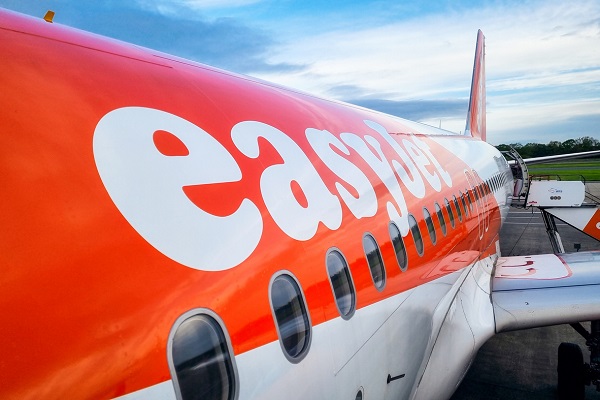easyJet sets out plan to deliver £1bn profit
Business is looking better for the budget airline, but there's been a mixed reaction to this year-end trading update. Our head of markets picks out the important numbers for investors.
12th October 2023 08:21
by Richard Hunter from interactive investor

easyJet (LSE:EZJ) is in fine fettle at the moment, with the planned return to dividend payments and ambitious new growth targets clear signs of management confidence in prospects.
Investing in airline shares has always been a challenge, and the events of the last week have underscored how external factors can undermine progress. The tragedy of a new Middle Eastern conflict has weighed on the sector as a whole, while a fire at its home airport in Luton is also potentially damaging.
- Learn more: SIPP Portfolio Ideas | How SIPPs Work | Transfer a SIPP
Over the course of the year easyJet has faced the additional headwinds of rising fuel prices, a stronger dollar, inflation manifesting through increased ground handling fees and employee costs, and the uncertainty surrounding the immediate fate of the consumer given the UK’s economic backdrop.
Yet easyJet has soared above these clouds to record a record fourth-quarter pre-tax profit, expected to be in the range of £650 million to £670 million. This has been propelled by passenger growth of 8% and revenue per seat rising by 9%. The group’s increasingly significant bonus from ancillary revenue, which includes the likes of customer payments for personally allocated seats, baggage and food, jumped by 14% in the quarter. Meanwhile, a load capacity of 92% means that little is going to waste, while easyJet’s propensity to aim for major airports in Europe sets it apart from many of its low-cost competitors.
In this trading update for the year ended 30 September 2023, easyJet said it expects annual pre-tax profit of between £440 million and £460 million includes a stronger-than-expected contribution from its easyJet holidays arm, where previous guidance of around £100 million of pre-tax profit has been strengthened to around £120 million.
While the unit has been contributing revenues which account for just 10% of the overall figure, the launch of this package has clearly come at the right time, playing into the minds and wallets of cost-conscious consumers. Nor does the group intend to stop there, with one of its new growth targets including more than £250 million of pre-tax profit.
- Stockwatch: the implications for investors of new Middle East conflict
- Lloyds Bank shares: Q3 2023 results preview and new price target
- Richard Beddard: this £2bn company is a winner and good value
Elsewhere, the focus on controllable costs remains evident, which is an important consideration for lower margin operations. Revenue per seat for the full year is expected to rise by 20% to £79.84, while costs are likely to rise by 11% to £76.25. More broadly, increasing tailwinds have left easyJet holding net cash of £40 million, a significant swing from the comparable period last year, when the group had £670 million net debt.
The outlook is equally upbeat, with capacity expected to rise by 15% in the first quarter of the new year, with load factors in line. It is the announcement of a new set of targets, however, which underline the group’s commitment to further growth.
easyJet will be modernising its fleet for at least the next decade, while aiming for a pre-tax profit per seat of £7 to £10, and a return on capital in the high teens. It will also aim to reduce its winter losses, provide a further boost to easyJet holidays with the overall aim of exceeding £1 billion in pre-tax profit.
- US bank sector earnings season: high expectations for these big players
- Buy this solid $200bn stock when it does this
- Dumb Money: when investors get caught out by bubbles
In the meantime, an improving financial position has perhaps finally removed easyJet from the ravages which the pandemic wrought, and the reintroduction of a dividend seems to draw a line in the sand, such that the company can move on to its next phase of development.
easyJet is clearly on a strong flight path, although the share price recovery still has far to go. Despite a hike of 48% over the last year, as compared to a rise of 7.6% for the wider FTSE250 index, the shares remain down by 35% over the last two years and by 56% over the last five.
However, this latest update should provide significant promise on longer-term prospects, and the fact that the market consensus has recently nudged higher to a 'cautious buy' is evidence of some growing support from investors.
These articles are provided for information purposes only. Occasionally, an opinion about whether to buy or sell a specific investment may be provided by third parties. The content is not intended to be a personal recommendation to buy or sell any financial instrument or product, or to adopt any investment strategy as it is not provided based on an assessment of your investing knowledge and experience, your financial situation or your investment objectives. The value of your investments, and the income derived from them, may go down as well as up. You may not get back all the money that you invest. The investments referred to in this article may not be suitable for all investors, and if in doubt, an investor should seek advice from a qualified investment adviser.
Full performance can be found on the company or index summary page on the interactive investor website. Simply click on the company's or index name highlighted in the article.